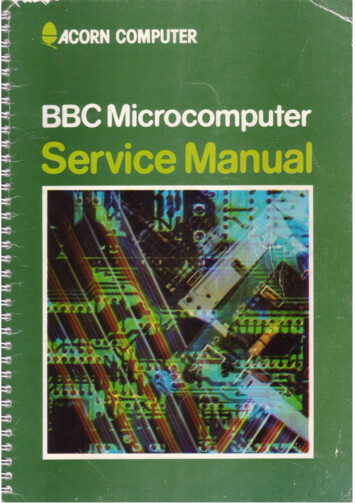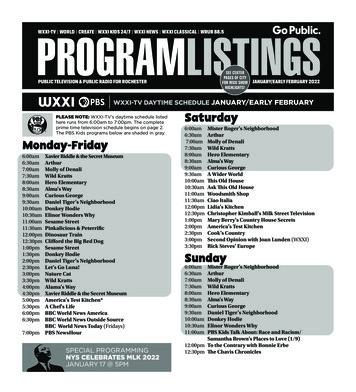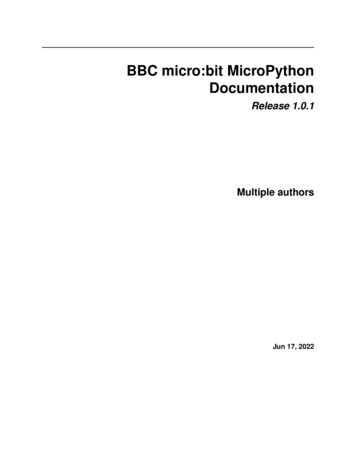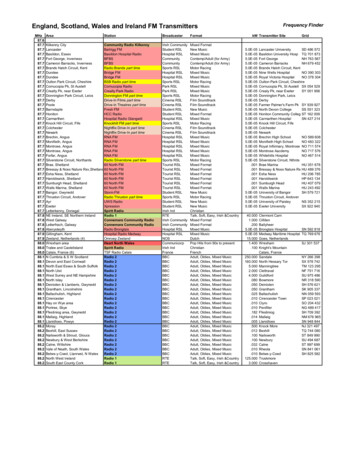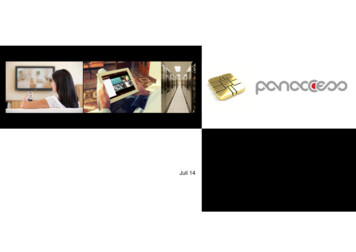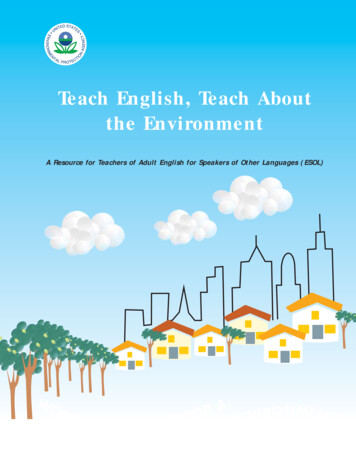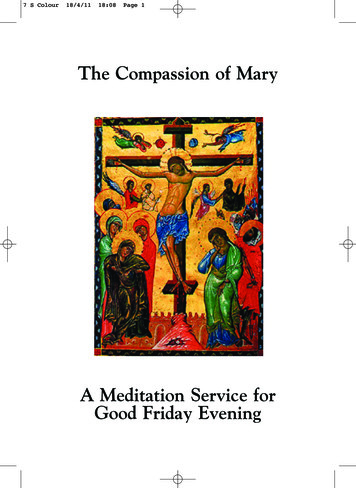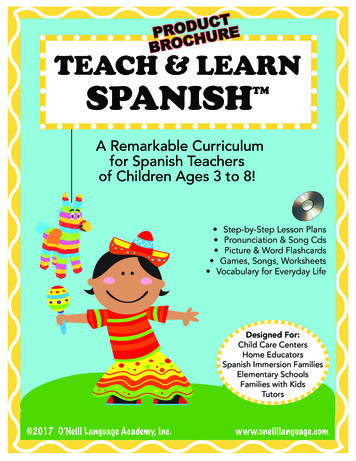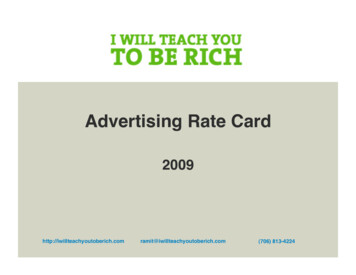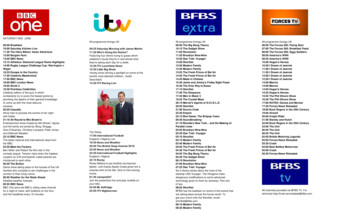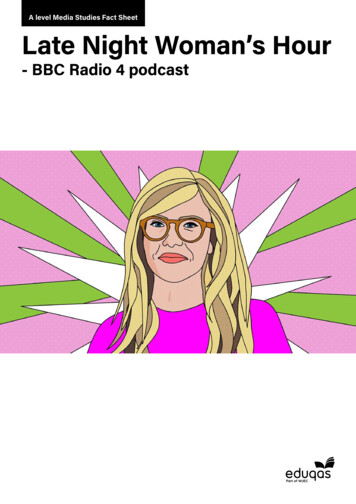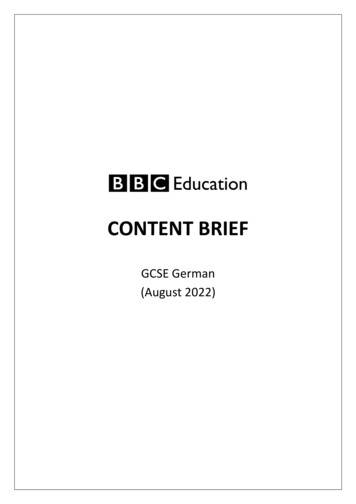
Transcription
CONTENT BRIEFGCSE German(August 2022)
CONTENT BRIEFGCSE German (August 2022)Introduction to BBC EducationThank for your interest in this commissioning brief. This commissioning round is being run and managed byBBC Education. The department is responsible for delivering the BBC’s Royal Charter commitments tocommission and produce educational and learning content, to help with both informal and formal learningoutcomes, for use throughout the United Kingdom.One of our aims is to promote and support formal educational goals for children and teenagers (meeting therequirements of the different national curricula in the UK), by producing engaging learning content for use inthe classroom. Some of our current brands that support formal learning in UK classrooms are:BBC Teach: Supporting schools and teachers by reinventing schools TV for the digital age throughengaging video content.BBC Bitesize: Providing children, young people and adults across the UK with personalised,curriculum-linked resources to support their education and offer support for a range of topics, fromcareers and work experience to healthy relationships and mental wellbeing.BBC Education campaigns: Large scale, impactful initiatives that aim to tackle a societal or culturaldeficit – often in partnership with others (for example, Super Movers and Tiny Happy People).Media use in the classroom and the provision of video in schools is a fast-changing environment. The days ofscheduled schools’ content and teachers having to set VCRs in the middle of the night to record programmesare long gone. With the increased use of the internet in classrooms, teachers now have unprecedented accessto a whole range of resources to help with delivering the curriculum.While there is plenty of content available online, teachers come to the BBC because it is a trusted brand andrecognised provider of quality teaching resources. The content we are seeking to commission will be availableto teachers through our BBC Teach brand; a dedicated teaching resource site at www.bbc.co.uk/teachPage 2
CONTENT BRIEFGCSE German (August 2022)BBC TeachBBC Teach is home to all of the BBC’s teacher-facing content, bringing together thousands of short educationalfilms on one site. BBC Teach works closely with teacher groups to identify gaps in our short-form provision andcommissions the right content to fill them.Examples of existing BBC Teach content for secondary schools include:Explain This GCSE ScienceThis series of short explainer films comprises three clips each for GCSE biology, chemistry and physics.Each film focuses on a GCSE required practical included in AQA, Edexcel and OCR specifications.The Colour of my Skin - Real stories of racism in the UKThis powerful collection of short, animated films uses real testimony from young people of colour toexplore personal experiences of racism, bullying and isolation. These are real stories of racism in theUK.Digital LiteracyThis series of short films for secondary schools uses animation and real-life case studies to explore keyissues around digital literacy and online safety.GCSE English LanguageA series of short films designed with the English Language GCSE curriculum in mind and intended tosupport students working at a mid-level with their understanding of the writer’s craft.Inside the Writer's MindThese short films for secondary schools offer exclusive insights into the ideation and writing processesof top writers working across several genres. From playwrights to poets via children's authors andgraphic novelists, each short film follows a real writer's journey – from how they find their inspirationand work with a stimulus, to how they edit and perform a written piece.French GrammarThis series of films follows the adventures of four British students as they compete in a variety of funand exciting challenges while on holiday in Paris.Small AxeShort educational films exploring the lives of London's West Indian community during the 1960s, 70sand 80s, produced alongside the BBC One collection of films directed by Oscar winner SteveMcQueen.Page 3
CONTENT BRIEFGCSE German (August 2022)Content BriefThis commission will support BBC Teach’s collection of content for 14-16 year-olds.Across the country there is a divide in terms of take up of languages with those students who are socioeconomically disadvantaged being much less likely to continue to study languages at KS4. There is a push toencourage more students to study languages at KS4 with an ambitious DfE target of 90% by 2025. German inparticular has declined with the growth of Spanish.There are a variety of reasons learners cite for not progressing with study including: perceived lack ofrelevance, perceived difficulty, and lack of progress in learning. In 2016 there was a pedagogy review for MFLand subsequently the “National Centre for Excellence in Languages Pedagogy” (NCELP https://ncelp.org/ ) wasestablished, which has developed resources to support teachers to address these challenges.The production of these films comes at a time of transition for GCSE in German. There is a new GCSE on thehorizon, which pupils will start studying for in 2024, with the first examination in 2026. Current year 7students (June 2022) will sit the new GCSE exam. The new GCSE is based very much on the NCELP approach.The current GCSE is driven by themes such as holidays, school, free time, house and home, the environment,careers, etc. In the new GCSE there are suggested contexts which have cultural, geographical, political,historical and employment related relevance. However, these contexts are only suggested and the assessmentis based around specific knowledge from the three pillars of vocabulary, grammar and phonics. This knowledgeis very tightly prescribed and examination boards will only have the option to define 20% of the vocabulary intheir specification.In order to ensure relevance of these films for the current GCSE and the future GCSE overlap can be found interms of grammar and vocabulary. The grammar in the new GCSE is very similar with a slight reduction inrequirement. The vocabulary for the new GCSE is selected from the most frequently used words so there isstrong overlap.When considering scripts for the films, writers should draw from the prescribed list (at the link below on page125.) Ideally, the script would reduce to a minimum any words from outside the prescribed list. In terms ofcontext the main overlap can be found in the areas of culture and employment, but writers should not feelconstrained by this. Any context is suitable for the new GCSE so account can be taken of the current GCSEtopics (a link to the AQA specification is given below).Ofqual guidance for the new nment/uploads/system/uploads/attachment data/file/1076402/FGS subject content 09 05 2022.pdfAnnex page 20 for German grammarAnnex page 125 for German vocabularyAQA Current GCSE Topics can be found at man8668/subject-content/themes#Theme 1 Identity and cultureProposals should include suggestions for ten films, using the following topics:1The present tense23The perfect tense with habenThe perfect tense with sein4The future tense with werdenDifferent verb endings and that it translates presentcontinuous e.g. I am doing, as well as I doRegular and some key strong verbsVerbs of movement from one place to the other e.g.verbs gegangen, gefahren, geflogen1,2,3rd person singular and first-person pluralPage 4
CONTENT BRIEFGCSE German (August 2022)56Making things negativeImperfect of haben and sein7Modals8Word order main clauseinversionAsking questions inversionand key question wordsWord order withsubordinating conjunctionse.g. weil/ obwohl910Use of nicht and keinIf allows some other listed high frequency examples e.g.ging, konnte, wollteDoesn’t need to be all of them in all forms but shouldinclude the conditional “möcht” if time allowsStarting with a fronted adverbial e.g. a time phraseKey question words wo was wer wann wieCompare with und and aber which don’t change theword orderMany students studying German may not get the opportunity to visit the country – a problem compounded bythe Covid-19 epidemic. To aid teachers with this, we anticipate this commission to be predominantly liveaction, including some location filming in Germany.What We’re CommissioningThis commission is for approx. 40 minutes of video content: 10 x 4min films to support the teaching of German for children aged 14 to 16 years old in UKsecondary schools.Each film is to be accompanied by a short summary and detailed teacher notes. These will bepublished on the BBC Teach website alongside the films.The content of the films must be educationally robust, with all resources devised and delivered in consultationwith an educational consultant to be agreed between the independent production company and the BBC.An inclusive approach is vital to audience engagement. All films should be engaging and accessible to theentire audience regardless of sexuality, ethnicity, culture, ability or gender identification. Films should besensitive to a diverse audience and in a style appropriate to the content, complementing existing BBC Teachfilm resources.Teachers will use this content either as a whole or in parts to deliver their lessons to their pupils.Education ConsultantYou will need to work with and contract an educational specialist/consultant who will be involved throughoutthe process to ensure all learning objectives are covered and content is accurate and relevant. Your consultantshould provide advice on which content is the most useful for the audience, as well as reflecting therequirements of the national curricula and guidance for schools.All content (i.e. video concepts, initial scripts, final scripts, teacher notes, rough cuts, fine cuts, etc.) will needto be reviewed by the consultant before being sent to us.The BBC will also engage a German specialist to consult on the content for us at each stage of production.Page 5
CONTENT BRIEFGCSE German (August 2022)ScriptsBBC Education requires full consultation during the scripting process, including the viewing of drafts to ensurescripts hit the learning points, and full sign-off on completed scripts – these should also include Englishtranslations. Please allow time in your schedule for BBC reviews.BudgetPlease provide a budget summary, more details may be requested at a later date. Please note that your budgetsummary should be exclusive of VAT. The finer details of the payment schedule will be agreed with the BBCProduction Manager on commission.The BBC Education tariff ranges from 500 to 2000 per minute. Budget is dependent on the idea and editorialambition. The maximum budget for this commission is 80,000.Your budgeting should not assume that the BBC will deliver archive at no cost. Independent producers haveaccess to the BBC archives subject to the usual copyright restrictions of reuse, etc.Please refer to the Independent Production User Guide and the FAQ for independent companies for moreinformation: PACT june 2016.pdfDocumentationThe following postproduction documentation must be completed upon final delivery: Postproduction paperwork must be completed via Silvermouse (details will be outlined in the contractto the awarded commission);Postproduction transcript – timecoded; andOnline compliance form.DeliverablesHD video delivered in both compressed and uncompressed formats; subtitle files (EBU-TT-D XML), transcripts,metadata; post-production paperwork, series and clip summaries, accompanying teacher notes in Word.docformat.Commissioning schedule18 August 2022:18 September 2022:W/C 19 September 2022:W/C 26 September 2022:March 2023:Brief liveDeadline for proposalsVideo pitchesDecision and award workProject deliveryPlease note that this document is for information purposes only and does not form part of a contractualagreement with the BBC.Page 6
CONTENT BRIEFGCSE German (August 2022)ContractingThis is a stand-alone new media commission and the BBC will require all rights in the content, worldwide andon all platforms. The commission will be contracted using the BBC’s Digital Rights Model 2 ractual#digitalrightsmodelsBBC policies and guidelinesFor information on these please follow this link; BBC Health & SafetyThe BBC needs to ensure that any Independent Production Company it commissions is able and competent tomake the programme with due consideration for health and safety. The following link will take you to a guidewhich outlines the BBC's health and safety vetting procedure and afety/thirdparties/working-with-indies.If the content being commissioned involves working with children, then ensure that you are familiar with theBBC’s Child Protection Policy and the Child Protection Safeguarding Framework, which provides a guide to theminimum levels of safeguarding on any productions. Information on this can be found tion/articles/working-with-childrenIf you have any queries or concerns about any of the guidelines or polices then please contact the BBC Teachproduction manager: Laura O'Dwyer (laura.o'dwyer@bbc.co.uk)Diversity and inclusionThe BBC is for everyone, and to reflect our audience in its entirety, both on and off screen, is at the heart ofeverything we do. As part of your submission, you will need to demonstrate that your editorial team on thisproject is inclusive and diverse. Suppliers that support our strategy and goals, and reflect them in the ideasthey pitch, stand the greatest chance of being commissioned.You can view and download BBC Education’s new diversity and inclusion commissioning guidelines here.These guidelines set out how we will work with suppliers to meet our ambitions for diversity and inclusion.Please consult these guidelines when responding to any of our commissioning briefs.ProposalsProposals should be provided as either MS Word documents or PDFs. They should be a maximum of 10 pageslong.Proposals should include:Page 7
CONTENT BRIEFGCSE German (August 2022) A clear explanation and understanding of learning objectives for 14-16-year-olds across the UKA clear editorial vision: an overall vision for the look and feel of the films (this might include sampleimagery to demonstrate the proposed look and feel or reference to existing examples)An explanation for how your editorial vision addresses the learning objectives for the target audienceBoth a schedule and budget breakdownEvidence of your capacity to deliver this suite of filmsPlease note: we do not require sample scripts, taster reels or animatic/animation examples at thisstage.Please note: BBC inboxes cannot accept files larger than 10mbAll proposals should be submitted via email to Morgan Makin morgan.makin@bbc.co.uk and Alex Harrisalex.harris@bbc.co.uk by 23:59 on Sunday, 18 September 2022.Page 8
GCSE Science This series of short explainer films comprises three clips each for GCSE biology, chemistry and physics. Each film focuses on a GCSE required practical included in AQA, Edexcel and OCR.
